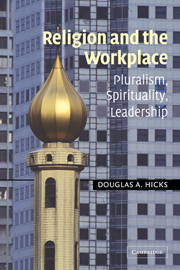Book contents
6 - Religions of the workplace
Published online by Cambridge University Press: 02 December 2009
Summary
Religion and spirituality in the workplace often refer to a religion or spirituality of the workplace. I have suggested that a critical distinction can be made between the beliefs and practices of individual employees, on the one hand, and the rituals and ethos of the organization, on the other. The wider question of organizational culture has received significant attention in the leadership and management literature. Some scholars have noted, in descriptive–analytical terms, the ways in which an organization's culture can be religious, quasi-religious, or spiritual. Other scholars have actually played a direct role in contributing to, or even promoting, the religion or spirituality of corporations, accepting the view that business leaders should serve as “spiritual guides” and that firms should develop their own “organizational spirituality.”
That some scholars have encouraged companies to become more explicitly religious or spiritual – whether via de facto Christian establishment or via a generic spirituality – has created significant controversy and criticism. Why would a business get involved in promoting spirituality or a specific religion among its employees? Do the company leaders take proper consideration of the religious, spiritual, and moral diversity of their employees?
Advocates of both the Christian workplace and the generically spiritual workplace are in agreement – and are correct – on one point: Workplaces that promote a fully secularist position (i.e., keeping all religious and spiritual expressions outside the workplace) are also imposing a values-based worldview on their employees.
- Type
- Chapter
- Information
- Religion and the WorkplacePluralism, Spirituality, Leadership, pp. 113 - 133Publisher: Cambridge University PressPrint publication year: 2003



